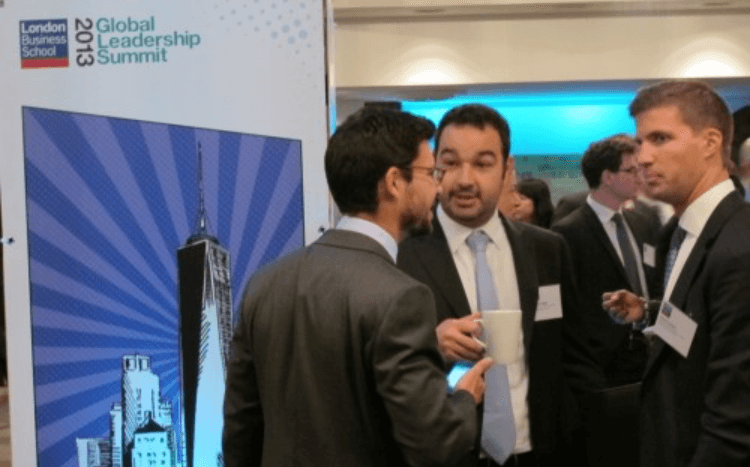Presidents, CEOs and professors surprise us with their candid remarks at this year's impressive Global Leadership Summit organised by London Business School
More than 300 movers and shakers from the business world gathered in a London (converted) brewery this week to debate the 'Future of Leadership'.
The event, an
annual summit organised by London Business School (LBS), was a meeting of minds from the financial, corporate and charity sectors, with big-name speakers from the likes of Deloitte, Unilever and Coca Cola, and LBS star professors including Julian Birkinshaw (Strategy & Entrepreneurship), Julian Franks (Corporate Governance), Andrew Scott (Economics) and Lynda Gratton (Management & Organisational Behaviour).
Delegates were a mix of LBS students past and present (a ballot was held for current MBAs), City workers and entrepreneurs, all hoping to learn something new about leadership, rub shoulders with a few CEOs or just swap business cards during the gourmet food breaks.
The summit theme was designed to take the leadership debate "beyond heroes, villains and scapegoats" and move discussion away from a simple dichotomy between goodies and badies.
Leadership was addressed in the programme in a variety of contexts: business, finance and political leadership, innovation and sustainability - somewhat predictable themes for a b-school conference, but the caliber of speakers and energy of the sessions were quite remarkable. The Heroes & Villains conference theme with comic-strip pop-art visuals, a punchy conference chair (CNN's Richard Quest), interactive voting and fast-beat interval music (imagine a gym exercise class) all added a degree of pizzazz to the day.
Also, refreshingly for this type of suited and booted conference, the speakers were authentic and candid.
Conference opener
Josef Ackermann, admitted that European leaders are "muddling' through the aftermath of the financial crisis - an interesting choice of words from the Chairman of Zurich Insurance Group (a USD $50bn+ turnover business) and former CEO of Deutsche Bank. Good on you Ackermann - we can trust the Swiss-Germans to tell it like it is. Most of the audience agreed - whipping out our electronic voting pads, nearly 70% of us said that European leadership has made the 'crisis' worse.
The first panel, on the future of financial leadership, contained some honest remarks too. Tim Breedon, an LBS alum and non-exec at Barclays Bank, said that pay in banking had been a "catastrophic disaster" and "should never have become the primary incentive for bankers".
Breedon, who emphasised that time-starved Non-Executive Directors cannot be "moral guardians" of companies, said that Barclays is trying to re-focus on core banking functions of lending to citizens and companies and that their loan books reflect this. He believes organisations need to become more "purpose led".
Martin Wheatley, CEO of UK regulator the Financial Conduct Authority, somewhat surprisingly announced that bonus caps are not necessarily a "good thing", explaining that it's helpful to have a discretionary element to pay that can be clawed back in times of poor performance.
Tanned Chairman of Italian bank Monte dei Paschi de Siena, Alessandro Profumo, in another wave of candor, attributed the survival of his bank to a state bail-out and declared that they are rapidly cutting costs, closing branches and mostly distributing other banks' financial products. Profumo also said that when it comes to culture, they like to lead by behaviour and had no qualms in sacking staff who were not aligned to the firm's values.
Continuing the spirit of unreserved straightforwardness, this time on the topic of BRIC economies, Martin Gilbert, long-standing CEO of Aberdeen Asset Management said his fund managers are making money in India (as long as they trust the family business), struggling to make money in China and loving 'Frontier' markets (e.g. Nigeria and Qatar) but find it tough to get enough money in to these fast-growing economies. He refrained from comment on Russia (fearing radioactive recriminations?!).
Glamorous entrepreneur-turned-angel-investor Dale Murray, openly declared that some businesses are just 'too niche' without the ambition to scale for her to be interested in. Fellow entrepreneur and CEO of Huffington Post, Jimmy Maymann told us to be wary of trendy crowdfunding - you might be better with informed investors than a bunch of strangers backing your business.
Coca Cola's handsome European President, James Quincey, said Coca Cola, like other food & beverage companies, has a role to play in getting people off the sofa and lowering their blood pressure.
Deloitte Talent Partner Heather Hancock said the consulting behemoth had recently scrapped their traditional annual report and decided to pin their performance to the "impact" they make, not just financial results.
And last up, for a final spoon of medicine, the impressive Icelandic President boldly told the room that: "Europe needs to get out of its ideological straitjacket. Its legacy is not financial markets, it is democracy."
All in all a worthwhile "day out of the office" with some honest commentary from a bunch of very influential people. London Business School pulled out all the stops and put on a show befitting of a global bastion in business education.
Check out our summary of the event in tweets here!







